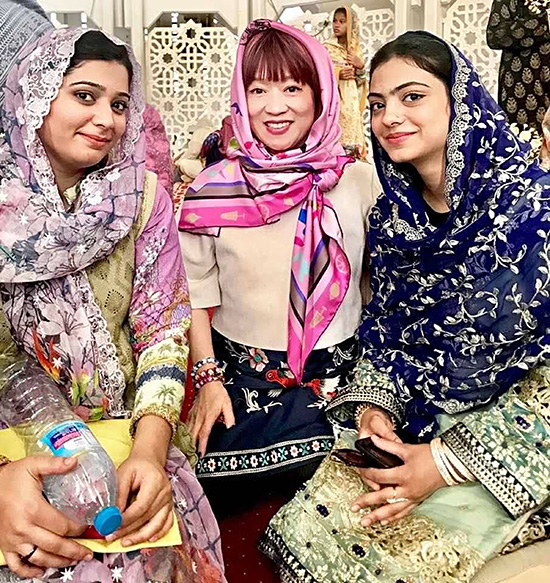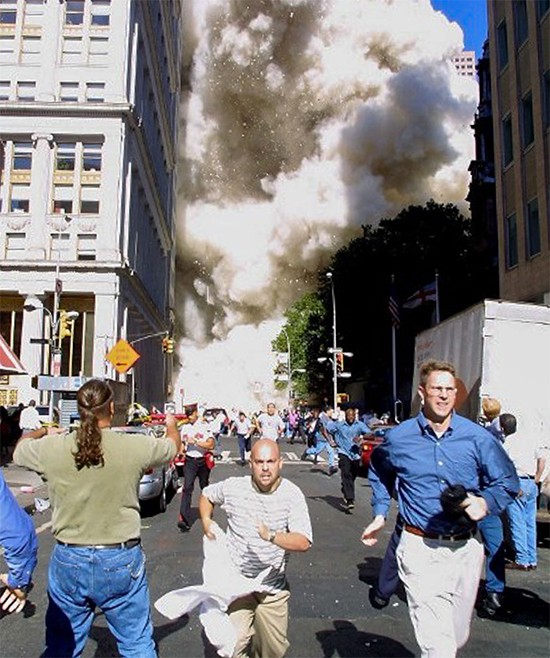20 years after 9/11: ‘There is no moving on, but I have moved forward’
Vina Francisco is a 9/11 survivor.
On its anniversary every year, she would develop hives, perhaps a recurring symptom of the trauma she underwent. She survived the twin blasts on the World Trade Center because she couldn’t find her eyeglasses and was late in walking out her front door — the door to her destiny and her second life.
But on the 20th anniversary of 9/11, Vina, who was in New York as she was two decades years ago, had no more hives or unpleasant dreams. Or tears. She has triumphed over the trauma, the fears and the biases that erupted from the terrorist attack that almost claimed her life.

In November 2018, three years before the 20th anniversary of 9/11, Vina, a principle human resources specialist of the Asian Development Bank since 2010, went on her first assignment to the Pakistan Resident Mission in Islamabad, ADB’s second largest office outside of Manila after Beijing.
The meaningful trips to Pakistan and working with Pakistani and Afghan nationals have rewritten the chapters of Vina’s life, chapters that could have remained embittered and chained to the past. Her life’s narrative has changed.
“Never in my wildest imagination did I ever consider that someday I would be travelling to and working in this part of the world. In the aftermath of the 9/11 terror attacks, Pakistan meant: Osama Bin Laden, Al-Qaeda, the Taliban,” she recalls. “In my first few years with the Bank, I travelled mostly to London, France, Germany, Spain, the US, Singapore and Korea as a speaker and recruiter for ADB. Until that point I had only been to two developing countries for ADB: Bangladesh and Sri Lanka.
“To my surprise, in 2018, I was re-assigned to cover 10 countries in Central West Asia including Pakistan and Afghanistan, which meant I would be travelling to these countries. While my bosses knew about my 9/11 experience, I knew it was not top of mind for them (rightly so) when they re-assigned me but it was definitely top of mind for me. I have a history with these two countries and I knew I was about to embark on an emotional journey that could either propel me forward positively or set me back emotionally.”

She had ultra-stringent security clearances before she could go on her ADB mission. On her own, she also registered with the US State Department to let them know she was going to be in Pakistan. Before she could even finish registering, an alert window popped up to say “Reconsider Travel to Pakistan.”
“I went anyway,” says Vina. Perhaps, she was fortified by her own personal mission to rise above the trauma of 9/11 and her quest to conquer her fears and reclaim her belief in the innate goodness of man, regardless of race and creed.
“I was in Islamabad for about six days. The Islamabad that I saw was surprisingly pretty with the mountains as a backdrop to long and wide boulevards and green open spaces, but of course I only saw the red zone. The only things that suggested there was danger lurking were the numerous checkpoints, a strong military presence all over the city and the fact that I was riding around in a bullet-proof car.”

A few days after she arrived, the Chinese Consulate in Karachi was attacked, which raised the security alert status in Islamabad. Vina’s boss then asked her if she wanted to head back to Manila earlier than planned. But she decided to finish her work.
“I was enjoying my work with the ADB staff there. I looked forward to the daily calls to prayer that resounded all over the city several times a day. I liked the feeling of challenging myself emotionally not to be afraid. I was an American in Islamabad on Thanksgiving Day. That’s who I was. I was liking my visit.”
She returned to Pakistan seven months later, in June 2019. “This trip was even more meaningful than the first. This time my work wasn’t just in the ADB office. I met with Pakistani government agencies, visited a local hospital, met with my counterparts at the World Bank, and visited the American International School of Islamabad.”
But the highlight of this trip was her visit to an ADB hydro project outside of Islamabad. This small project provided livelihood and electricity for 100 families, mostly headed by women, in three villages.
“We headed out, a convoy of three cars traveling north for almost three hours towards the hydro project site. We drove on wide-open highways, some of them developed by ADB so we stopped to take photos. I took photos of the local scenery from the car window. What I didn’t realize at first was that we were in Abbotabad in the province of Kyber Pakhtunkhwa. When I realized where we were — I fell silent in disbelief. I did not say anything to anyone and just silently took in the reality of where I was. I was in Abbotabad — the city where Osama bin Laden lived for five years and where he was captured and killed by the US Military in May 2011. Oh my God. Am I really here?” she recalled.
The meaningful trips to Pakistan and working with Pakistani and Afghan nationals have rewritten the chapters of Vina’s life, chapters that could have remained embittered and chained to the past. Her life’s narrative has changed.
“Sometimes in life — you are given the chance to come full circle — and I believe I have,” she says gratefully. “There is no moving on from 9/11 but I have definitely moved forward. I am now a development professional working for Pakistan and Afghanistan. The staff I hire, coach, train and work with in Pakistan and Afghanistan are the very same people who are working hard to alleviate poverty and hardship in this country and I am grateful to be part of this.”
Vina still hopes that someday she will still be able to visit the ADB office in Kabul.
“I need to make that trip for myself. It will mean a lot. Another opportunity to complete a second circle in my life ... moving forward from 9/11.”
Banner photo by Seth Mcallister/AFP


